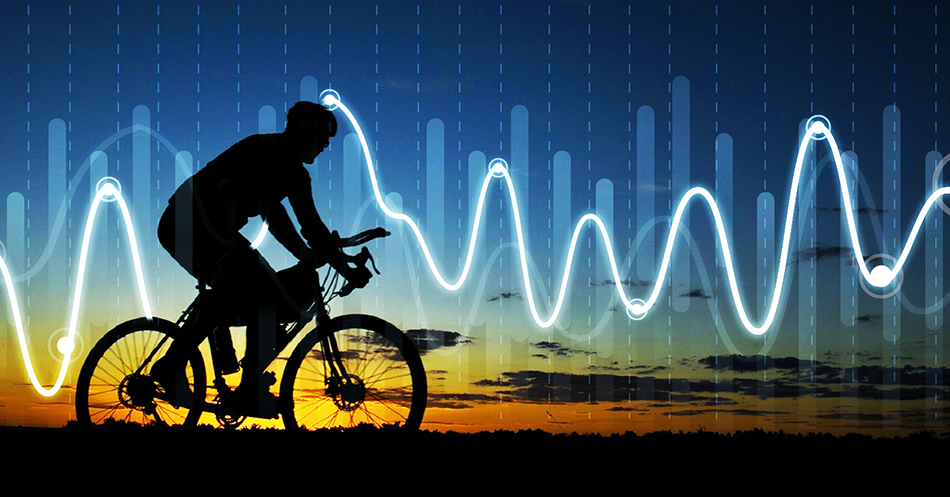
Can you actually quantify wellness? Sure, there are things like The Oxford Happiness Survey, Emotional Intelligence Quotient tests and even something called The Spirituality Index of Well-Being, but how close can you actually get to a quantifiable estimate of how well you truly are?
Say hello to Tomek Bielanski, senior analytics consultant at our digital consultancy, krunch.co. Tom has spent the last two years trying to track, crunch and analyse all the real-time data about himself that he can possibly capture, all in an attempt to attain a numerically calculated state of wellness nirvana. Plus, lose 25kg in the process.
We sat down with Tom to learn a bit about his data-driven journey and get some advice on how to launch our own quest for a quantifiable state of wellbeing.
How does your data-gathering day usually start?
Well, I wake up in the morning and my Garmin watch is already tracking my physical activity. It starts with how much sleep I got, my heart rate and my exercise throughout the day. All that information syncs up with the Garmin Connect app on my phone and then into an online app called Exist that serves as the central hub for all my data.
So you basically have a virtual Tomek living in the cloud?
Ha! I guess you can say that. I’ve basically tried to set up the most automated system possible. That’s been the key to sticking with it. If it was too manual I would never have stuck with it. Because Exist integrates with so many different services, I’m at the point where 90 percent of the stuff I track happens automatically. For example, when I stand on my Nokia WiFi scale in the morning, it automatically syncs with my phone’s Healthmate app — pulling my weight and body mass along with fat, muscle, bone and water percentages — which also integrates and syncs with Exist.
Now for the most obvious question: Why?
It all started because I wanted to lose fat, get fit and just feel better so I could be healthy for my family — and be able to fit into all the clothes in my wardrobe. I gave myself two goals: Lose 25kg and run a marathon. That was two years ago. So far I’ve lost 12kg and I’m training to run the Auckland Marathon this October. Because I’m a data geek, quantifying the whole process has really helped to keep me motivated.
What other services do you use?
I log all of my calories and macros in MyFitnessPal and use the Strava app to track my bicycle commute and running training. I also try to meditate three times a week and will log those sessions in Google Fit on my Android. All these are connected to my Exist account along with a couple other services I use to grab interesting information about what’s happening in the world. It enables me to connect the data together and make meaningful correlations between how I’m feeling inside and what’s happening outside. It’s cool.

Like what?
I have an app called Dark Sky that tracks weather/daylight information and my Last.fm account syncs songs I listen to throughout the day. I also try to rate my mood, focus, productivity and other wellness metrics throughout the day directly in Exist, which has a reporting feature that can draw correlations between things like how the weather affects my training performance or which playlists help me be more productive. It also compares my stats to the user average.

Tomek points out that his productivity data is still manual, so it’s “not very accurate.”
Have any unusual insights surfaced?
Some of the insights are consistent with general trends, like that I tend to get more steps when it’s a sunny day, and fewer when it’s windy. Some helpful ones have surfaced too, like the fact that I work out for a longer distance when I’ve consumed more protein.
And then there’s the less straightforward ones… like how I listen to more Michael Bublé when I get fewer steps?!

Do you have any privacy concerns about all of this?
The way I see it, our phones are already sharing this data with corporations. So the more I track it, and the more I know about it, the more insight I have about the data that is already being collected and used. This way I’m not a clueless person who doesn’t know what’s going on with the phone in my pocket. I understand the implications. Knowledge is power, right?
What does your wife think?
She thinks I’m overdoing it. She makes fun of me. But I think she is just envious.
Keep telling yourself that. Finally, any advice for people considering tracking their wellness stats?
You need to be committed because it doesn’t come easy. You need to build a habit around the process and automate as much as possible. The bottom line is that your insights and results are only as good as the quality of the data you are gathering. It doesn’t work if you’re not consistent. Also, prepare yourself for some difficult truths that your data might reveal. It’s not easy learning that Taylor Swift might actually be your secret productivity booster.
Robert Moritz is the executive creative director at krunch.co, a digital consultancy started in July 2015 and based in Auckland. We take a multidisciplinary approach to digital transformation, helping brands blend data, tech and content to change the way they engage with their audiences. Read more on our website.




